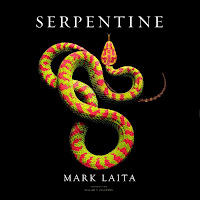I was placing an order recently and I realized I was off my estimate by about $100. I needed something quick to order. I keep 2 card boxes at my desk filled with possible titles, but for some reason I decided not to go to these. They were filled with hundreds of titles that I thought would be great to order...one day. Instead I went to Amazon and clicked on the Art and Photography category. This was not a random pick. Most of the order I had placed was photography, art, and decorative art books. My collection was lacking in art and photography materials and anything decorating related will get checked out by half, if not all, my coworkers. I decided to get something fresh and new. Luckily, Amazon had just listed their best picks for 2013 so I went with the top two: Beautiful Whale by Bryant Austin and Serpentine by Mark Laita.
As a child I loved snakes. Like most children I had a strange fascination with them that terrified my parents. As an adult, my fascination subsided and fear set in. What if I encountered a snake while walking through the woods? What is my dog was bit by one in the yard? I lost my enthrall.
When I saw Serpentine I knew it would constantly go out. Why? As I stated above, children love snakes. Anything on snakes is always going to check out. When it came in I was surprised to find that it was more of a fine arts book than educational.
I decided to check this out and give it a good look through. I didn't just want to skim it. I really wanted to understand where Mark Laita was going with his work. All the photographs are set against a black backdrop. Laita featured the photograph on the right page and the left side blank. The lack of image on the left side of the book reiterated Laita's goal of focus on the serpent. Occasionally Laita would include a quote on the left side that focused discussed the misinterpretation of evil.
The photographs themselves are stunning. The various position of the snakes, the twisted movements of their bodies, adds to the artist nature of the images. Not only are these creatures created strikingly gorgeous, but Laita's photographs add a touch of elegance to these misunderstood serpents.
As I mentioned before this is more of a fine arts book, but I don't want you to think that there was no educational material. At the end of the book, Laita created a visual glossary where every image is represented again (in a smaller version) and the basic information is provided: Name, Family, Binomial, Other Names, Location, Habitat, Length, Feeding, and Breeding. Though this information is basic it does answer the basic questions people might have: Is this snake poisonous? Where does it live? How big does it get?
If you are able to view Serpentine, I highly recommend it. Please be sure to take the time to study the photographs and also the format of the book. Laita does a wonderful job of presenting these creatures in a beautiful light. You won't find any fang shots or a scary striking serpent. Whether or not your perception of these creature changes, you might find yourself admitting their magnificence and the beauty of the nature that created them.
















0 comments:
Post a Comment